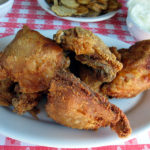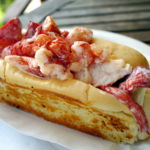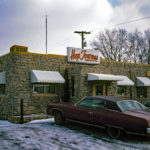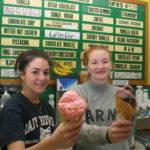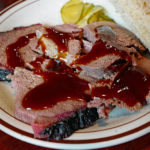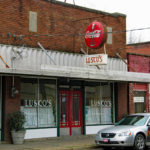Our Excellent Adventure
IT WAS AN EMBARRASSING little secret: We had never been to France. Friends and colleagues were shocked. It was outrageous that we two, who have spent the better part of the last quarter century writing about food and travel, had never once visited the cradle of cuisine, where Julia Child, Samuel Chamberlain, M.F.K. Fisher, and countless other fines bouches had enjoyed something close to a religious experience. To us, life without France made sense. Driving all over America looking for great regional food had kept us quite busy. Also, we were sensitive to the mumblings about the French regarding us Americans as a motley bunch of gluttons who stuff our maws with hot dogs and hamburgers ... which, in our case, was completely true.
By Jane and Michael Stern
Originally Published 2001 Gourmet Magazine
IT WAS AN EMBARRASSING little secret: We had never been to France. Friends and colleagues were shocked. It was outrageous that we two, who have spent the better part of the last quarter century writing about food and travel, had never once visited the cradle of cuisine, where Julia Child, Samuel Chamberlain, M.F.K. Fisher, and countless other fines bouches had enjoyed something close to a religious experience. To us, life without France made sense. Driving all over America looking for great regional food had kept us quite busy. Also, we were sensitive to the mumblings about the French regarding us Americans as a motley bunch of gluttons who stuff our maws with hot dogs and hamburgers … which, in our case, was completely true.
Given that our idea of heaven is a sweeping Montana two-lane and a big V-8 humming toward a wide horizon, we were shocked one day to find ourselves at home in Connecticut surrounded by guidebooks to France and a few hundred handwritten, faxed, and emailed tips from everyone we had ever met telling us where to find the best macaroons in Paris and the most savory flatbread in Nice. We had only to utter the word France to transform friends and casual acquaintances into human search engines.
Even though everyone insists that the French all speak English, we decided that it might encourage them to be nice to us if we could speak their language. Michael has a knack, and by the end of high school he knew French, Russian, a little Chinese, and even some self-taught (and ever so useful) Esperanto. With the help of a six-CD set, he was soon having involved conversations with the audio system in the car whenever he drove. While Jane has no knack for languages, she does have a passion for gadgets, so she found a handheld electronic translator into which you type an English phrase and then press a button so its French equivalent magically appears. You show this to the French person with whom you are trying to communicate, then Monsieur or Madame types a response in French; you press the button again, and the response appears in English. It seemed like a good idea at the mall where she found it, but the reality of typing “Can you tell me where the bathroom is?” and then jiggling about with an expanding bladder while you wait for a stranger to read your prose and then compose an answer began to evoke a high-tech version of The Miracle Worker. Instead, Jane settled for a few simple phrases, which she wrote phonetically in an e-note to herself on her Palm Pilot. Once on the plane, however, she could make no sense of her pidgin francais. “Michael, do you know what voo le voo comb ian la sheek de las vooy assh means?”
“I think it may have something to do with traveler’s checks,” Michael guessed, knowing Jane well enough to figure it had to involve shopping.
Jane spent much of the transatlantic flight trying to recall the meaning of oomboolence and why at one time it had seemed important to know it. Finally, she settled on memorizing three words to make her way around France: bonjour, merci, and MasterCard.
WE ARRIVE MIDDAY in Nice, where Avis hands us the keys to a brand-new manual-transmission Citroen. It is 2:30 and we are ready for lunch. However, we quickly learn that by 2:30 in France, lunch is over, finis. In America, people eat all the time, day and night, especially in the truck stops, diners, and cafes we frequent. In France, people eat their meals at mealtime. What a novel concept.
Customers are gone from Brasserie de l’Ouest, where a sign outside advertises “SES GRANDS SANDWICHS,” but we can see the owner sitting with a friend drinking red wine from an unlabeled bottle and eating the plat du jour, which looks swell. Using his newly buffed French, Michael pleads our case well enough to be waved in by the owner. “Chez moi, vous mangerez!” he says, then disappears into the kitchen to put together a pair of regal baguettes filled with garlicky salami and cornichons. Later, over cups of café au lait sprinkled with cocoa, he tells us that he visited New York a few years ago and found it to be the most polite place he had ever been. His evidence: He saw citizens in Central Park picking up after their dogs! “Such love!” he exclaims with a roll of his eyes.
The sandwich flips a switch, and we are suddenly insatiable. Across the way, at La Lorraine, we gape at impossibly delicate meringues, creamy “Tropeziennes,” and wispy strips of crisp-fried pastry dough blanketed with powdered sugar, labeled “Merveilles.” “A specialty of here!” says Mademoiselle behind the counter, meaning that Merveilles are a specialty of this particular bakery, or perhaps of Nice, or France, or Europe. We don’t exactly know, because, contrary to what people assured us before the trip, we find that nobody in France speaks English, or, if they do, that they choose not to speak it to us. (In addition, we’d been warned that the French can be surly, which we also find to be untrue. Our France is a land of people who are kind and generous even if they don’t understand a word we say, not even Jane’s bonjour, merci, and MasterCard.)
Most of the time, language isn’t a problem since eating is universal, and as we peel away from Nice heading for a hotel in Aix-en-Provence, the interior of our Citroen begins to look like the stage for a Christmas pageant at Radio City Music Hall, sprinkled with enough powdered sugar from the Merveilles to make Santa feel at home.
A friend who’s a member of the Explorers Club and spends his time visiting ocean bottoms and mountaintops had lent us his Global Positioning System device to help us navigate around France. The GPS and several road maps result in our being lost virtually all the time. Perhaps lost is not the right term, as we always know where we are—we just rarely have a clue how to find any place we want to go.
Faxed directions from the Hotel des Augustins in Aix specifically said, “Do not lose your time trying to get in the little street we are located; double-park your car on the main street (Cours Mirabeau) in front of the pharmacy. We will give you instructions then.” Accustomed to our homeland’s E-Z-on, E-Z-off road culture, we never imagined that pulling up to the front of a hotel could drive us to the edge of insanity. It is easy enough to find the Cours Mirabeau, a grand boulevard that is the scene of construction work on a scale akin to Boston’s Big Dig. We are able to drive past the pharmacy in a single lane of bumper-to-bumper traffic bordered on one side by concrete barricades and on the other side by parked cars wedged into every available space, but stopping is not possible anywhere within a mile before or after passing the drugstore. On the third drive-by, Jane leaps out of the car and runs behind the pharmacy into the hotel. Thirty minutes later, on lap four, the desk man is waiting with Jane in the street. They grab luggage from the trunk and, with cars beeping behind him, Michael lurches the Citroen forward while trying to make sense of the clerk’s harried directions to a public parking lot across town.
The next morning, we decide that our plan to “drive around town,” American-style, is not a good one. French streets are not made for cars, nor does it seem that French cars are made for people. When we picked up our Citroen, we thought it was tiny, but in Aix it feels like a ’59 Cadillac compared to the midget-mobiles whizzing around us. About the size of La-Z-Boy recliners on skates, French minicars have silly names like Twingo, Poopski, and Twiddle and would be laughed off the street in any midwestern town.
Walking around Aix, we find the Place Richelme, a broad city square with a produce market in the center. It is as picturesque as a travelogue: shoppers carrying woven straw baskets picking out perfect fruits and vegetables, debating with the fishmonger over briny bouquets of oysters, and holding up slender glass bottles of fruit nectar to see the purity of their jeweled colors. It is all so French, so perfect, so charming. Amid the tangle of people, pet dogs wander off the leash. When they bark, it is “Oeuf! Oeuf!” Even the dogs in France don’t speak English.
We wander the Place Richelme all morning, experiencing a world unlike that of American supermarkets, including a boucherie with a Brueghel-like display of fresh-killed pheasants and rabbits hanging outside, their plumage and fur still glossy. At one of Aix’s venerable chocolatiers, we eat divine nougats called Victorines. At L’Unic Café, we drink strong coffee and eat croissants. We want to see it all, taste it all, smell it all. We have been in France less than one day.
On the road from Aix to Avignon, we realize that the cues on which we have relied to find good eats in America are largely absent in France. There are no colossal plaster pigs or cows on restaurant roofs to alert us to great pork barbecue or 72-ounce steaks. On the other hand, following the truckers to find good food turns out to be a fine idea. A parking lot full of long-haul trucks marks Brasserie Bellevue, off RN7 in Bouches-du-Rhône; inside, routiers (truckers) eat at long communal tables. As in America, the drivers sit elbow to elbow, smoking and talking and digging into hearty meals. Alongside the men of the road, we plow through large bowls of couscous (as much a staple for routiers as chicken-fried steak is for American truckers) followed by a fairly amazing tray of cheeses—hard, soft, crumbly, blue, old, mild—and strong black coffee.
THE BEST TRUCK-STOP COUSCOUS we find is at Relais des 6 Boules, along A6 east of Paris. “Vous etes routiers?” the host asks incredulously when we sit down at a table in the middle room, which we discover is reserved for drivers. The host resettles us in the “family room,” which is outfitted with pink linen napkins instead of the truckers’ plain white ones. No matter what other dish we ask about, he insists we have couscous royale. A splendid presentation, it begins as he sets heated soup plates before us, padding each with steamy grain. We are invited to ladle on root vegetables, chickpeas, and broth from a big tureen, and to pick hunks of lamb, chicken, and the slim, spicy sausage called merguez from a serving plate. On the side is a cinnabar-red hot sauce; wine is stashed in a silver bucket, the bottle wrapped in a linen towel.
North of Rouen, we meander onto tiny roads through ancient pastureland of dreamlike serenity. Shaggy ponies graze along the path; centuries-old farmhouses overlook rolling fields of grass; an old woman stands in her doorway and waves just because someone is passing by. Near the village of Nochize, we see a hand-written sign on a fence that says “ATTENTION TAUREAU!” Down the road, we spy the notorious bull, who, like so many French citizens, is engrossed in his meal, in this case a bale of hay. The bull is a Charolais, named after the town of Charolles, where La Maison du Charolais features entrecôtes, filets, and tartares of the local beef.
After a night in a silk-draped canopy bed at the fairy-tale 18th-century Château de Germigney in Franche-Comte, we head toward Paris on an ecstatic pink cloud of Francophilia. Our euphoria quickly evaporates. Words cannot convey the horror of trying to accomplish the simple task of dropping off our rental car amid Sunday traffic in Paris. Let us just say that there is not one gendarme, not one pedestrian, not one gas station attendant who has a clue how to help us find where we need to go. At one point, with Michael beating the dashboard with the map out of frustration, Jane steers the Citroen backwards down a one-way street, beeping like mad and sending old ladies and shoppers fleeing for their lives.
Finally rid of the car, we check into the Hotel BuciLatin, a stylish little place on the Rive Gauche with faux hip-hop graffiti in the stairwell and the door of each room painted idiosyncratically (ours looks like the wooden logs of Davy Crockett’s cabin). For three days, we do what tourists do: the Eiffel Tower, the Louvre, the Cathedral of Notre-Dame. We shop at Hermes, gluttonize at Fauchon, have tea at Mariage Freres, gape in awe at rainbows of fresh and candied fruits at Hediard, and think of ways to sneak home kilos of ripe cheese from the cheese shop to end all cheese shops, La Ferme St. Hubert.
On our last evening in Paris, we lie under a fluffy snow-white duvet and flip on the TV. Outside the hotel window, we can hear Parisians sitting at sidewalk coffee shops and clinking glasses in bistros; conviviality permeates the night air. Michael commandeers the remote control and finds The Dukes of Hazzard dubbed in French. At home, we never much liked the show, but here, suddenly, it is riveting. American country boys careen along wide-open roads in The General Lee (their gas-guzzling muscle car), evading police, pirouetting on two wheels, exuberantly kicking up waves of dirt at every turn, omnipotent and unstoppable. We figure that in France, land of little cars and donkey-cart streets, The Dukes of Hazzard is like terrific pornography—the depiction of impossible, ecstatic feats that everyday people can only dream about. We imagine what it would be like to, drive wild and free down the Champs-Elysées as Twingos and Poop-skis respectfully pull aside to make an open road … and for the first time, we get a little homesick .
Discuss
What do you think of Our Excellent Adventure?
Related Articles
Stroud’s
By Jane and Michael Stern Originally Published 1995 Gourmet Magazine Chicken...
The Lobster Roll Honor Roll
Maine is the only state in America that features a picture of cooked food on its license...
Meat-And-Three
A few years back, country singer Ray Stevens invited a New York friend to join him at one of...
Top 12 favorite Ice Cream Scoops
WITH THE EXCEPTION of the hot dog bun, there has never been an edible invention as...
Top 5 BBQ Restaurants | Western Kentucky
Get yourself to Western Kentucky for great BBQ I see the food shows on TV where...
Best restaurants in Greenwood, MS | Hot Licks Delta Style
Ever since we first ate margarine-sauced pompano at Lusco’s, in Greenwood,...

